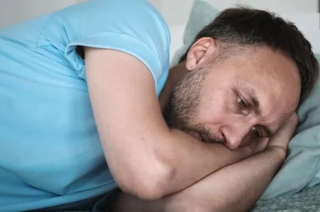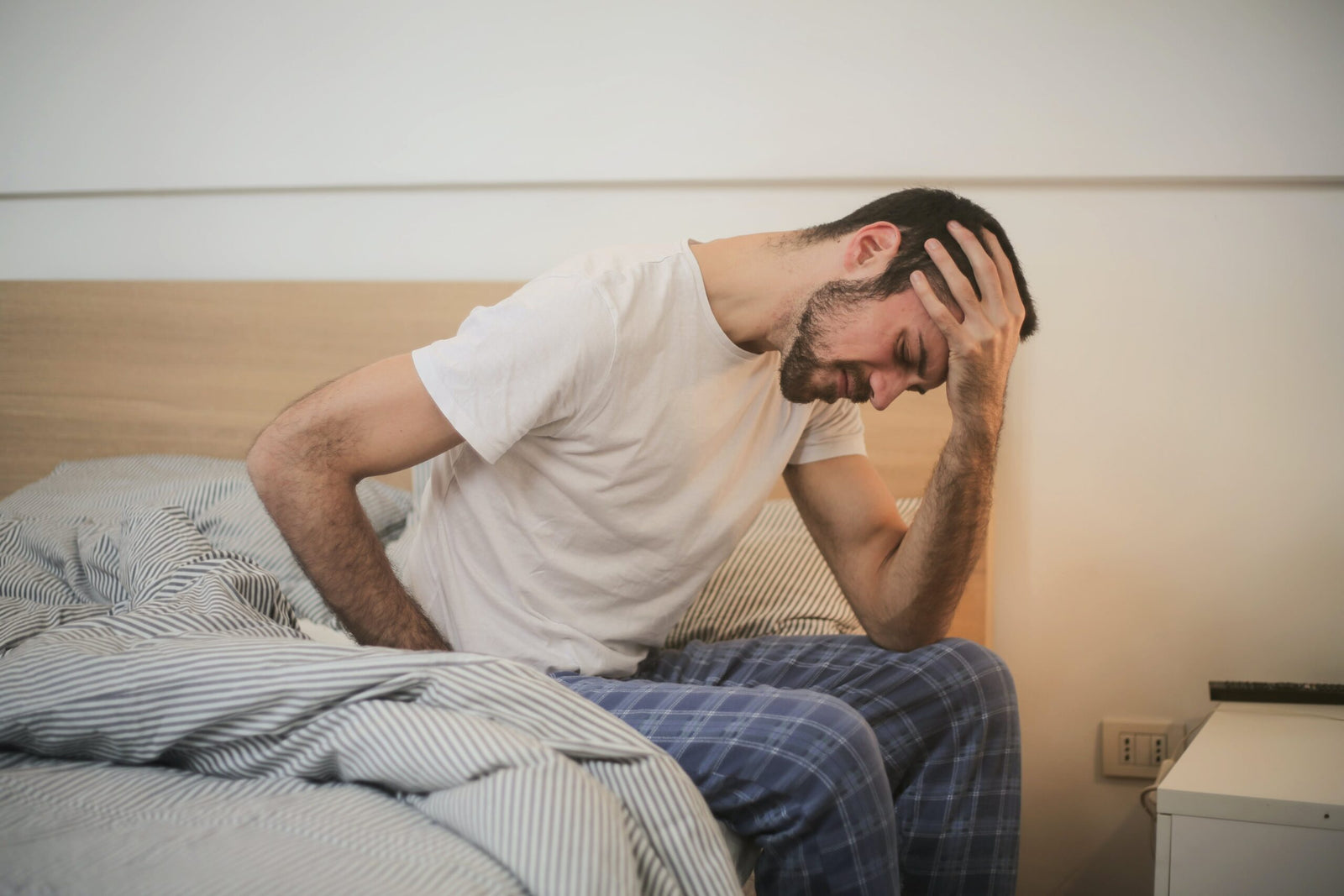
Interrupted Sleep
Recently, there has been an uptick in conversation suggesting Interrupted Sleep might actually be worse than Sleep Deprivation. This may be quite the understatement. Afterall, what’s more frustrating than having your peaceful, cozy, desperately needed sleep, invaded? Especially since getting back to that blissful state may take a while—or not happen at all.
Having your sleep suddenly disrupted is like a vampire sneaking up on you at night. It drains your energy and leaves you feeling fatigued, disoriented, and not looking too well the next day.
It is so damaging in fact, that a team of researchers from Tel Aviv’s University of Psychological Sciences, found the cumulative effects of interrupted sleep equates to getting no more than four consecutive hours of sleep. That’s about half—or less, of the recommended 7—9 hours. That kind of sleep loss can have devastating consequences.
It's like getting no sleep at all
The study published in the Journal of Sleep Medicine states that interrupted sleep can be as physically detrimental as no sleep at all. It further links compromised cognitive abilities, poor mood and shortened attention spans to tiredness resulting from interrupted sleep patterns. Additional studies show that getting less than 7-hours sleep in a 24-hour period can lead to a number of chronic health conditions including asthma, depression, diabetes and heart disease.
Further consequences of poor sleep
The loss of even a single hour of sleep adversely affects our body across all its systems. It prevents optimum brain function; alters our metabolism, raises our stress hormones and lowers our immunity.
Sleep loss also brings significant mood changes. This may have a damaging influence on our world view—and can lead to strained relationships with others. All these interrupted sleep effects leave us open to physical, psychological, and emotional challenges that negatively impact our overall quality of life.
The key takeaway here? Don't take interrupted sleep lightly. Understanding the what’s and why’s of your fragmented sleep is a good place to start. Learning how to deal with sleep disruptions effectively will help ensure a healthier, happier You.
The loud sounds of a city can be hard to sleep through—sirens alone, register 120 decibels

So, what's interrupting Your sleep?
While there are many things that may fragment your sleep, here are 14 of the most common sleep disruptors—along with some tips and coping strategies to help you deal with them.
Once you’ve gone through this list, take a deeper look into any sleep disruptors that may be impacting you personally. As always, our goal is to guide you toward discovery, and solutions that can help you sleep better—nothing is meant as medical advice—that’s what your doctor is for. Now let’s begin with the unavoidable culprit…
1. AGING
As we age, it is common to see changes in what is referred to as our “sleep architecture.” This term is used to describe the way we cycle through our sleep stages. Typically, aging means we spend less time in the rejuvenating, deeper stages, of sleep. This contributes to restless, more fragmented, sleep cycles in older adults.
If you find yourself waking up more often during the night, you can’t exactly turn back the clock. But you can examine your basicsleep hygiene, and consider developing pre-bed strategies that encourage deeper, more restful sleep. On to the next ...

Consuming too much alcohol will commonly wake you up in the middle of the night
2. ALCOHOL CONSUMPTION
Alcohol is a notorious sleep cycle disruptor. While its’ sedative effects may help you fall asleep quickly, too much alcohol will commonly wake you in the middle of the night and cause frequent re-awakenings during the second half of your sleep. Because it relaxes the throat muscles, alcohol also disrupts breathing during sleep.
This is of concern for anyone who has Sleep Apnea as alcohol can interfere with the brain’s ability to recognize the resulting lack of oxygen—which can potentially lead to more serious breathing interruptions.
If you have Sleep Apnea, cutting back on alcohol, or avoiding it altogether, is recommended. For everyone, it is good sleep practice to cut it off at least 4 hours prior to bedtime.
Anxiety-prone individuals are particularly vulnerable to the effects of insufficient sleep

"How blessed are some people, whose lives have no fears, no dreads; to whom sleep is a blessing that comes nightly, and brings nothing but sweet dreams."
- BRAM STOKER
3. ANXIETY & DEPRESSION
Being worried or fearful impedes your ability to fall asleep and stay asleep. When you’re deprived of sleep, it creates a cyclical problem, and this only increases your anxiety. Research has shown anxiety-prone individuals are particularly vulnerable to the effects of insufficient sleep—these effects are even more complex if you’re dealing with anxiety and depression simultaneously.
In addition to certain medications, Cognitive Behavioral Therapy (CBT) has shown positive results. CBT is a talk therapy that helps re-orient negative thinking. This works to reduce anxiety, and in turn promotes sleep. Practicing good sleep hygiene and relaxation techniques are also helpful when these conditions are interfering with your ability to sleep.
4. CHRONIC PAIN
Chronic pain is sure to bring interrupted sleep—IF, you can actually fall asleep in the first place. Unfortunately, that disrupted sleep is also likely to bring increased pain levels the following day. Next day fatigue from lack of sleep may also impede self-care decisions like exercising and eating properly. All this is likely to affect you psychologically and emotionally—and can be taxing on relationships, especially when sharing a bed.
Practicing breathing and relaxation techniques is beneficial when dealing with pain and its impact on your sleep. Make sure to avoid stimulants before bed. It’s also important not to let any negative thoughts run wild. Consult your health care provider for help in managing your pain, and the emotional effects that go with it.
5. HIDDEN HEALTH ISSUES
In addition to pain, a number of underlying health conditions—diagnosed or undiscovered, can cause fragmented sleep. Health issues known to interfere with sleep, include asthma, Alzheimer’s disease, cancer, diabetes, GERD, heart disease, hyperthyroidism, and Parkinson’s disease.
Sometimes we brush sleep loss aside, maybe thinking it’s just stress. Sometimes it is. And sometimes, it’s not. And maybe “just” doesn’t belong in front of the word stress. Stress in and of itself, is a big contributor to poor health—with reports showing 77% of the population experiences stress-related health issues.
If interrupted sleep is making it hard to function during the day, it may be time to consult a professional. Early detection is always a better way to go—and if it’s nothing physical, you canput your mind at ease—which will help deal with the stress, as well as your sleep.

6. LIFESTYLE CHOICES
You are accountable, to a significant degree, for your quality of sleep. From the time you get up in the morning, until you lay down your head, the choices you make are setting the course for how you’ll sleep at bedtime. Create a lifestyle plan that sets you up for a good night’s sleep—every night.
This doesn’t have to be a drudge. Start simple, with changes like staying hydrated, and gently increasing your body movement. Spend time outdoors to up your vitamin D. Make better food choices—ones that feed your sleep—you may even find you prefer those choices in the long run. Finally, get rid of any vices that don’t benefit your body, or your sleep—it really just makes sense. Be consistent in your efforts to improve your habits and you’ll reap the benefits of better health as well as better sleep.
7. MEDICATIONS
A number of prescription drugs are known to disrupt sleep. These include asthma and blood pressure medications—as well as certain antidepressants. Over-the-counter allergy, cold, and pain medications, can also cause sleep loss—as well as products that contain stimulants such as caffeine.
Check the labels on all your medications. Suspect something is preventing you from sleeping well? Contact your doctor to see if an adjustment can be made so you'll be able to sleep better.

If you’re waking up more than twice per night to go to the loo, you may have Nocturia
8. NOCTURIA
The frequent urge to urinate during the night, is common in folks over 60, and often just the result of aging. It can be caused by a weakening of the bladder muscles... as well as a decrease in the antidiuretic hormone that helps us retain fluid. Other causes may be bacterial infection in the bladder, urinary tract infection, excess fluid intake, diuretics, kidney disease, dehydration or diabetes.
If you find yourself waking up more than twice per night to go to the loo, you may have Nocturia. There are medications available if you are diagnosed with this condition. They include a class of diuretics as well as a form of antidiuretic hormone. Some doctors prescribe a diuretic that encourages urination earlier in the day to decrease the amount of urine in your bladder at night.
Impulsive noise jars us out of our sleep and shatters our nerves

9. NOISE
Unwanted noise and the inability to control it is enough to drive a person mad. From a snoring partner in the bed next to you, to the sound of an approaching firetruck, impulsive noise jars us out of our sleep and shatters our nerves. The wail of a siren registers 120 decibels—it only takes 60 decibels of unwanted noise to raise your blood pressure. Managing these interruptions effectively helps keep us sane.
Reclaim yourpeace and quiet with noise masking earbuds that play soothing, brain calming, pink noise. Slip these into your ears when you slip into bed, and you won’t hear barking dogs, car alarms, screaming neighbors—or any of those other sleep-destroying noises.
10. PRIMARY INSOMNIA
The average length of sleep for someone with Primary Insomnia is only 6 hours—it is often hard for someone with this condition to fall asleep and stay asleep. Awakening easily, tossing and turning, and frequently getting out of bed are common symptoms. Noises may easily disrupt your sleep as well.
Primary Insomnia is common, but if it persists, you may need to seek evaluation—and possibly treatment to ensure you get adequate uninterrupted sleep. If Noise is the main issue, give the noise-masking sleep earbuds a try—they’ll help you get the sleep you need.

People with RLS commonly need to get up and walk, or massage their legs at night
11. RESTLESS LEG SYNDROME (RLS)
People with RLS experience an uncontrollable urge to move their legs. This naturally makes falling asleep and staying asleep extremely difficult. People suffering from RLS commonly need to get up and walk, or massage their legs in an attempt to control the tingling/aching which sometimes lasts for hours. While anyone can experience RLS, the condition is more common in older females.
It is also common for People with Restless Legs to feel fatigued during the day due to the severe disruptions to their sleep cycles.
In addition to medications that increase dopamine in the brain, gentle calf-stretches, and warm baths, can help ease symptoms. If you suffer from this syndrome, you should be aware that consuming alcohol can make the symptoms worse. Nicotine is also known to trigger RLS symptoms—and because it is a stimulant—generally disrupts sleep.
12. SLEEP APNEA
This serious sleep disorder causes a person’s breathing to stop repeatedly during sleep. People with untreated sleep apnea sometimes stop breathing hundreds of times during the night. Symptoms include loud snoring, difficulty staying asleep, gasping for air during sleep, waking up with a dry mouth and morning headache. It goes without saying, nothing good happens when your body is deprived of oxygen.
When left untreated, sleep apnea my result in a number of health problems including hypertension, stroke, cardiomyopathy, heart failure, diabetes, obesity and heart attacks.
If you suspect you have sleep apnea, it is recommended you see a doctor ASAP for a proper diagnosis. Depending on apnea type and severity, there area number of treatments that may be prescribed to get you on the road to better sleep.
End nighttime hunger awakenings by feeding your body properly during the day

13. WAKING UP HUNGRY IN THE NIGHT
The most likely reason for waking up hungry is either not consuming enough food during the day or eating five hours or more before going to bed. This confuses our fullness hormone, which then wakes us up because it thinks we need more sustainable energy.
End nighttime hunger awakenings by feeding your body properly during the day. Keep your glucose levels in check. Eat when you are hungry and try not to go more than four hours without food. Plenty of proteins, complex carbs, and healthy fats during waking hours will help prepare your body for uninterrupted, quality sleep. If you work out at night, don’t forget to refuel your body with a healthy snack.
14. YOUR SLEEP SPACE
Your sleeping environment, from the color of your walls to the way your room smells, affects your ability to relax and get quality sleep. Investing time in creating your ideal sleep space is an investment in your overall health and well-being. If your mattress or pillow doesn’t fit you right, if the temperature is too hot or cold, if there’s too much light—if there’s too much noise, if there’s not enough air flow—your sleep suffers.
Create a haven that’s just for sleeping. Leave the work you brought home from the office in another room… with all your tech devices. Adjust the thermostat. Spritz some lavender in the air. Wear comfy pajamas and slip into that perfect bed you’ve created just for you.

End Interrupted Sleep!
There’s no denying the critical importance of getting the right amount of sleep each and every night. Whatever is disturbing your sleep, there are steps you can take to get your sleep back on track.
Use these tips to help you deal with interrupted sleep and its negative effects. Explore more in-depth information in the enclosed links. Make getting better, uninterrupted sleep, a priority. You may not be able to totally control your sleep cycle, but every step you take will get you closer to enjoying all the healthful benefits of peaceful, uninterrupted sleep.
Here's to getting your best sleep and living your best life!
Resources:
Sleep Foundation - Stages of sleep
Mayo Clinic - Insomnia treatment
The Atlantic - City Noise Might Be Making You Sick
Well And Good - Wake Up Hungry
The conversation - why are we so sleep deprived and why does it matter
Sleep Foundation Guidelines/Sleep Qty
The Daily Mail - Irregular Interrupted Sleep
Masterclass.com - sleep fragmentation explained
Science slashdot org - interrupted sleep might be the best kind
Waking Up in the Middle of the Night Hungry? | Sleep Review (sleepreviewmag.com)
Harvard Health - Top 4 reasons why you're not sleeping through the night

































